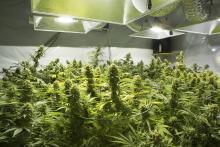
July 20 2018

In a recent case involving production of cannabis, KBC expert Richard Brown was asked to examine the scientific evidence and to provide an independent valuation of the cannabis. His conclusions highlight the benefits of obtaining an in-depth review of the physical set-up and an examination of the plants rather than just providing a valuation based on a potential yield which in itself is calculated simply on a head count of the plants.
Two rooms in a domestic house contained 16 and 4 cannabis plants, respectively. The equipment and plant development were very different in the two areas. The defendant claimed he was growing for personal use. The plants had been discovered in ‘grow tents’ with overhead lighting and other equipment typical of indoor cultivation set-ups. Only 2 from the group of 16 plants had been sampled and none from the smaller group of 4. Whilst seized as evidence, the 2 sample plants were never submitted to a forensic laboratory or otherwise examined by any Prosecution expert, despite the involvement of a Police Drugs Expert. The potential yield for the plants was provided as a very wide range (potentially spanning 2 or 3 sentencing categories) by this officer. This was applied to all 20 plants with no regard to stage of development, health, viability and equipment in use.
Mr Brown conducted an examination of the sample plants. He highlighted in his report that no plants had been examined by the Prosecution and that none of the 4 plants in the smaller room had been sampled/seized, precluding any examination by the Defence. Photographs of the scene showed these smaller plants to be an unsuitable size to thrive. They also showed a propagator which, the Prosecution expert attempted to argue, contained many more plants; despite its contents not being documented by those attending the scene. It was photographed with the lid on. The defendant’s account was found to be the more credible on this point.
Mr Brown successfully argued that the 4 smaller plants should be excluded from any yield or valuation calculations, as their viability had not been proven. Furthermore, Mr Brown was able to discuss the level of sophistication of the cultivation set-up, specifically that there was no evidence of a continuous production and only the basics in terms of equipment were present.
The court accepted Mr Brown’s report and the defendant’s account; many aspects of the Prosecution’s case were rejected.
In cannabis cultivation cases it is imperative that the plants, scene photographs and witness statements of those documenting the scene are assessed before providing a yield estimate.